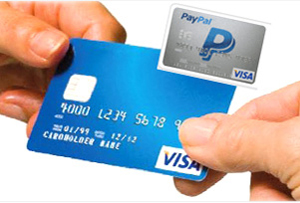 PayPal and Visa have inked a broad partnership agreement under which PayPal will steer more users to link their accounts with Visa products, a deal that resolves the long-simmering competition between the two payments groups.
PayPal and Visa have inked a broad partnership agreement under which PayPal will steer more users to link their accounts with Visa products, a deal that resolves the long-simmering competition between the two payments groups.
PayPal’s rapid growth has at times come at the expense of credit card networks, because so many users of PayPal and its subsidiary Venmo link directly to their bank accounts, bypassing credit cards.
Under the new agreement, PayPal will stop encouraging customers to link to bank accounts, and in return Visa will provide “economic incentives” to PayPal.
The deal will also give PayPal users access to Visa’s contactless payment points across the US, providing PayPal with an access point to in-store retail transactions.
“PayPal has been looking to tap into the physical world for a while now,” said Jordan McKee, analyst at 451 Research. “Tapping into the Visa token service provides an on-ramp for PayPal into in-store commerce.”
Both PayPal and Visa reported earnings on Thursday. PayPal’s revenue for the second quarter exceeded expectations, reaching $2.65bn, up 15 per cent from the same quarter a year ago.
Its earnings per share of 36 cents on an adjusted basis matched analysts’ forecasts, in a quarter in which total payment volume across the network surged 28 per cent.
Visa reported $3.6bn in revenues for its fiscal third quarter, up 3 per cent from the previous year.
The deal makes a lot of sense for Visa, said Michael Moeser, director of payments at Javelin, a research firm based in Pleasanton, California.
Previously, when a consumer signed up for a PayPal wallet then put a Visa card in that wallet, PayPal would incentivise the customer to link the wallet directly to a bank account instead.
“You can’t have somebody who cuts you off at the knees every time they sign up a new card,” said Mr Moeser, noting that PayPal has more than 180m active wallets around the world after years of “explosive” growth.
“Visa really needed to have a friend, because the ‘frenemy’ approach was not working,” he said.
At a company conference in May, Charlie Scharf, Visa chief executive, was asked about the “friend-or-foe” debate with PayPal. He replied in strong terms, saying that while the relationship with PayPal had driven a lot of business Visa’s way, PayPal was using transactions to “do everything they can” to get customers to ACH, the electronic clearing network for financial institutions in the US.
“Anyone that’s trying to take your customers and disintermediate you, is not a friend,” he said. “We’d love to figure out a different model with them where it’s consumer choice first, where they’re not disintermediating. If we can figure that out with them, great. We’ll think of them more as a partner.”
Mr Moeser said that MasterCard, Visa’s big domestic rival, will now be under pressure to follow suit.
Last year digital commerce, both online and mobile, accounted for $424bn, or 9.1 per cent of all retail sales in the US, according to Javelin. It expects that share to rise to $650bn in 2020, or 12.4 per cent of all retail sales.
Bill Ready, head of product at PayPal, said that PayPal had been making it easier for customers to choose different payment options, and pointed out that the cost difference between the ACH network and other options had narrowed over time.
PayPal’s shares rose 2 per cent in after-market trading, while Visa’s shares traded flat on the news.
(Published by Financial Times - July 21, 2016)